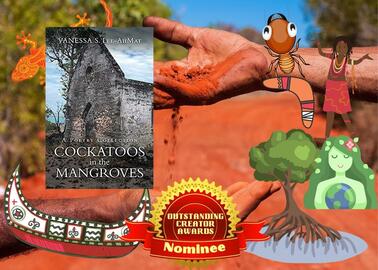|
Score: 93/100 (9.3 out of 10)
“Cockatoos in the Mangroves” is a demonstration of poetry as art! Dr. Vanessa S. Lee AhMat is a PhD, poet, and activist on behalf of the Aboriginal people, the indigenous people of Australia. She has been recognized by the Australian Parliament for her work, and her work, including "Cockatoos in the Mangroves" has also been featured in live on-stage performances. In other words, she is an incredible human being on a mission, and that definitely comes across in this poetry book! Dr. AhMat's biggest goals appear to be to raise awareness and advocate for the Aboriginal people of Australia who are historically marginalized after being displaced and nearly bred out of existence during the founding of Australia. Now, we usually take the phrase “raising awareness” for granted, and it's an idea that just gets thrown around casually by every advocacy group under the sun. People are constantly raising awareness of things from cancer to domestic abuse to gun-control, and one poem in this titled “Coloured Ribbons” actually points that out. What difference does it make if it doesn't lead to action? Action and driving positive change are ultimately the goal of raising awareness, let's not forget that. They put the “act” in activism. The author won't let us forget that. And back to the point: this book is a tremendous reminder of the power of activism and raising awareness—it actually prompted us to be interested enough in the subject matter to do research. It made us really truly care about the plight of the Aboriginal people, something that we're sure the majority of the world aren't knowledgeable of, much less sympathetic to. One of us is from Hawaii, and the plight of the Aboriginals looks and feels a lot like what the Native Hawaiians suffered—marginalized, displaced, their lands taken over, their language and culture dying. Every year, Hawaiian sovereignty groups mourn the loss of the their kingdom and call out for restitution, but to no avail. It almost always falls on deaf ears. We can't help but feel a similar sentiment from Dr. AhMat's poems. These poems are fierce yet beautiful. They are truly POWERFUL. Without even seeing or hearing these recited on stage, we already know that they are delivered with directness and strength. Many of these are beat poems. The lines are short and cutting. The words are pounding. There is one poem in here titled “Rope” that constantly repeats the phrase “to the left of the bucket / near the tap is the rope” which in turn creates a sort of rhythmic chorus for the poem. There are three poems in here (the “Girl” trio) that were inspired by an old church being reclaimed by nature. Now, here's the thing: you may be wondering how is that any different from the works of Elizabeth Reinarch constantly and relentlessly slamming on religion like a broken record three out of four books? First of all, it feels earned. According to Dr. AhMat and our research, many Aboriginals strongly feel (with evidence) that the white settlers weaponized their religion to weed out Aboriginal culture and subjugate the Aboriginal people. This was done, as stated in several poems, to seize land and natural resources, namely coal. In the poem titled “Eviction” the author states that “coal was chosen over life.” There are actually multiple layers to that statement. First, coal was chosen over the lives of Aboriginals, and secondly coal was chosen over the preservation of the earth. The author's second big argument is against pollution, the abuse of the earth's resources, and human beings driving climate change. That's a lot to unpack, but the point remains: Dr. AhMat's statements are not a blind, out of control rage session at Christianity or any other religion, it's a call to look at the facts and the evidence: the white settlers with their religion all but erased the Aboriginal culture and the Aboriginal people like they did in other parts of the world—Hawaii and Mesoamerica come to mind. We learn from poems like “As Black Women Do” that there was an attempt to commit ethnic genocide against the Aboriginals by breeding them out of existence and that Aboriginal women had been the targets and victims of rape and abuse. In “Called to Order” the poet talks about the “ghost of spiritual oppression” that includes the “rape, murder and oppression” of Aboriginals (especially Aboriginal women) that goes unpunished and even unacknowledged to this day. What's amazing is that Dr. AhMat does things that, under other circumstances and in less competent hands, would come across as annoying such as going after religion, going after capitalism, going after the patriarchy, and going after the west. These are things that just seem fashionable in today's society. It just seems like every college student these days needs to complain about one or all of these things. It just seems like every college student these days is taught to hate or at least be skeptical of religion, capitalism, the patriarchy, and the west because, well, that's the cool and hip thing to do now. They then overcompensate and start advocating for the extreme opposite, perhaps not realizing that the extreme opposite can be just as bad. It's just as bad to hate white people as it is to hate black people. In 50 years, we might be protesting secularism, socialism, the matriarchy, and the east. Can we just not hate any one group of people? To quote Rodney King, “Can we all just get along?” But we digress, it's actually a delight to listen to her vent her frustrations on these things, and they are certainly not unwarranted. Yes, history speaks for itself, but someone needs to share that history. That's why books like this are so important and invaluable. Check it out on Amazon!
0 Comments
Leave a Reply. |
Archives
July 2024
Categories |

 RSS Feed
RSS Feed